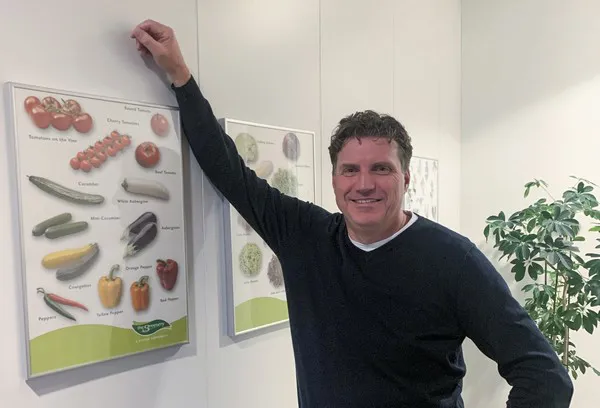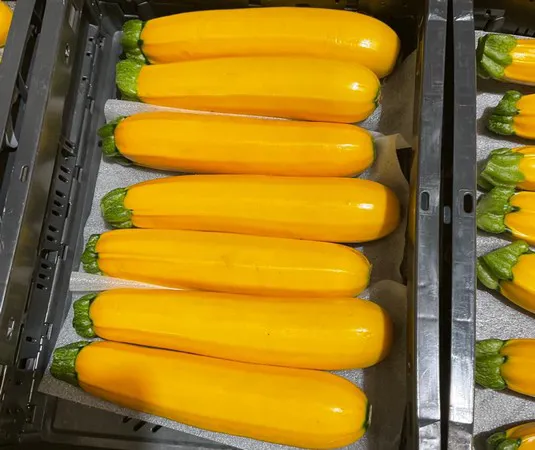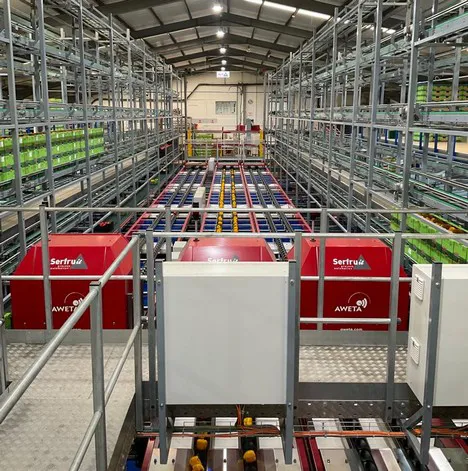The previous Spanish season wasn't even completely over when growers, buyers, and sellers were already meeting to discuss the 2021/2022 season. This is the result of years of uncertainty, which got worse because of Brexit and COVID-19, but not only that: prices are also ever-increasing from all sides.
Brexit has not had that big negative impact, but this fall, the energy crisis added a new level of concern. This is yet another factor that can influence the Dutch import season, which is also always heavily dependent on weather conditions. In early November, Ton Bouw of The Greenery shed some light on the matter.
At that time, the season had been going on for two months. Generally speaking, Spain has been starting the season earlier, recently. That raises the question of whether Spain has benefited (even) more from a faster decline in Northwestern growers' supply. This is a result of the energy crisis, that is not immediately evident to Ton.

Ton Bouw
"[The region of] Almería started early, especially with zucchini, which was two weeks early. But that isn't necessarily related to the situation in the Netherlands. Growers in Almería didn't see that coming, considering that they cannot foresee an energy crisis. The early start is much more of a consequence of last season's good prices in September and October. Growers were hoping to get those prices again at the start of this season. That, however, didn't happen."
Pointed peppers stand out
Zucchini is a true specialty of this Dutch fruit and vegetable importer. These are available year-round at The Greenery/Hagé International. They have green as well as yellow and special globe zucchinis. "This summer's prices were good. It's been a fairly normal season so far. Although September and October's prices were significantly lower than last year," says Ton.
The same is true for cucumbers. These, like zucchini, are a relatively short-lived crop. Growers bet on these crops because they hope it will give them greater flexibility in uncertain times. "There's not a big increase in acreage there either. Nor has the season's start really been the best."
At the same time, Almería's bell peppers' acreage did grow significantly - Ton estimates it to be by ten to 12%. "The season started quite normally. As it oftentimes is the case, it did with inferior quality due to warm nights. You need a few good cold nights to improve products' firmness. But none of them happened at the start of the season. That meant the products' shelf life sometimes wasn't as expected. But by now, that problem seems to be gone. The prices weren't very good, but that's not unusual, as long as the Netherlands and Spain are both on the market. Now that the Netherlands is off the market, Spain has more opportunities."
Quite unusually this year, growers have planted a lot more pointed peppers, besides block peppers. Bouw reckons about 15% more than last year. "This crop is really on the rise. You can no longer call it a specialty." The acreage of eggplant has grown too, but not by much. Prices, too, increased at the start of the season.

"The Netherlands had less product for two weeks. Spain could thus hitch a ride on higher prices. These have, however, normalized again. People will begin to switch now that the Netherlands is off the market. Eggplant, nevertheless, faired pretty well at the beginning of the season."
Zucchini declined faster
Southern Spain was spared terrible weather until early November. Growers are, nonetheless, already dealing with the usual problems, especially in zucchini and cucumber, Ton observes. "Virus problems are plaguing zucchini growers in the Níjar area, where many zucchinis are grown. That's similar to a lot of the cucumber regions such as Motril. This has been an issue for years, yet it seems even worse, this year. That's partly because it was relatively warm in September and October."
"Some growers had to pull out their plants earlier. In terms of availability, the usual hard period for zucchinis should come earlier this season. Availability could already decrease in November and December. That's usually from the end of December to mid-February. The virus is partly to blame, but also because of the season's early start. This is a short-lived, fast-growing crop, so it will also finish sooner. Now, there are (in week 45, ed.) several especially cold nights, with temperatures of three to four degrees Celsius. Then, the plants just stop growing."
There are no clear alternatives to zucchini in the summer. "Truly competitive growing countries don't come in at this time of year. Neither does Italy. They use most of their own production for local sales. Italy also only buys from Spain. Morocco, meanwhile, is starting up with zucchini too. But they cannot compete with Spain in terms of quality," Ton continues.
(New) opportunity for Spanish cucumbers
It is difficult to find zucchini anywhere else in winter. Not the same can be said with regards to tomatoes, and now also cucumbers. Growers in the Netherlands, but also in other northwestern European countries, have invested in lighting, which is quite a novelty for cucumbers. "If you asked me four months ago what that would mean for growers in Spain, I'd have said Dutch supermarkets would prefer lit cultivation cucumbers by far. Energy prices have, however, risen so suddenly."
"So, I think this change may not be as abrupt after all. Supermarkets have now realized that local production isn't always more reliable, not now that there are growers who aren't farming this winter. I expect that, in the future, there will be more risk spreading. Spain can benefit from that. Not in tomatoes, but certainly in cucumbers. Though, that remains to be seen. That's why there are parties who will still come to Spain. Especially now that there are fewer lit cultivation cucumbers," Ton explains.
Deals being made earlier
The term, risk spreading, has been mentioned. This is certainly not a new term. But, in light of recent events, everyone is (again) very aware of the importance of proper risk spreading. "Agreements are being made much earlier, which usually happened in May or June. This year it was in April. That's because of COVID-19, as there's an increased focus on supermarkets."
"The hospitality industry is picking up, in Spain as well. Yet, people are still looking for more stability. People have seen what happens to prices if you don't fix anything. You could suddenly be confronted with huge demand. Then, you pay top prices if you can get any product at all. Everyone remembers the images of empty shelves," says Bouw.
And growers, too, want stability. "All materials are becoming pricier. Fertilizer costs 30% more, and power even 200% more. Spanish greenhouses don't use nearly as much energy as those in the Netherlands. But the warehouse machinery and refrigeration consume electricity. Even solar energy cannot always make up for that."
It is precisely in trying times that investing in good mutual relationships pays off, notes Ton. "In our case, these are investments that started 30, 40 years ago. That's when we pioneered importing from Spain. By buying products in good and bad times, you build trust. That pays off in times of crisis."
Unpackaged cucumbers
Spanish growers must take the even earlier closing of deals and program filling into account. But can they do that? They seem to respond every year to previous years' successes. That is the case this year with zucchinis. "Yes. You can't make deals without the growers. They don't just put anything out there. Just like the practice of sending random wares to the Netherlands has become increasingly less commonplace. Growers, however, always have some room."
"They use this as a buffer when things go wrong. But that still doesn't mean that there's still availability, if you demand products at the last minute in September or October. They could still be available, but no longer at the desired price or customer specifications." Ton says those specifications are becoming increasingly important. "Large German supermarkets, for example, are now definitely opting for unpackaged cucumbers without a plastic seal. Even in winter."
Serious machinery
When it comes to processing products, packaged or not, people are increasingly considering automation. That is also happening in Spain. That became clear to Ton during a recent visit. Higher minimum wages are an important reason for this. "There used to be, say, 12 or more people needed in the zucchini packaging process. That number can be significantly reduced by using machines. Workers are becoming scarcer. People sometimes no longer want to work in greenhouses or warehouses."
"That's why machines are coming into the picture. And it's serious machinery that you don't see everywhere, even in the Netherlands. Those machines now make it possible to work according to all packaging specifications. That's also necessary because of the increased online orders." With regards to labor, cutting back the maximum working hours is another consideration. "That's now limited to close to 40 hours a week. So, there are more shifts in warehouses. That's to make up for the lost flexibility."
Moroccan competition
Labor is less of an issue in Morocco, where costs are different. That is a matter of concern, particularly in Spain, which is in a fierce competitive battle with the North African country over greenhouse vegetable cultivation. It is well known that there is a steady decline in tomato acreage in Spain, while that is growing in Morocco. But, the cultivation of other greenhouse vegetables is also gradually increasing there. "Looking at hard numbers, the loss of tomato doesn't represent much yet, but that's increasing," says Ton.
"Moroccan zucchinis have been around for a while and do compete with those from Spain. There's still, however, far better availability, quality, and volumes of the Spanish product. There are cucumbers from Morocco, but these don't go to the Northwest European market. There have never been that many bell peppers, but this is slowly changing. Growers from Spain and also places like Israel have begun setting up bell pepper crops. Here, however, cheap labor doesn't play as big a role, like it does in tomatoes and, to a lesser extent, zucchini."

Spain has a long season and favorable climate with lots of sunshine. So, it remains a formidable player with or without the expansion in Morocco or the increased lit greenhouse cultivation in northwestern Europe. "When there are shortages, people always look to Spain. You see that again now that there are problems in the lit cultivated crops," says Ton. "But also this summer with, for instance, floods in Germany and South Limburg. Then many zucchini were lost. We then automatically look for product in Spain for our year-round zucchini."
"I'm sure that when Spain shows what it can do, especially thanks to mechanization, customers will return. For now, Spain is increasingly trying to find its own path. Until ten, 15 years ago, people relied heavily on the Netherlands. That dependence is now decreasing. Our good relations with Spain remain, and that's what really matters," Ton concludes.
Ton Bouw
The Greenery
t.bouw@thegreenery.com
www.thegreenery.com
